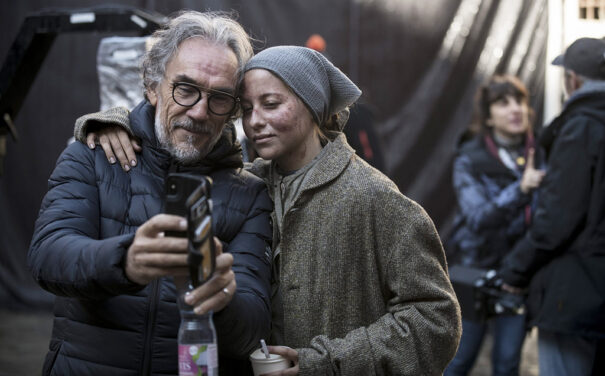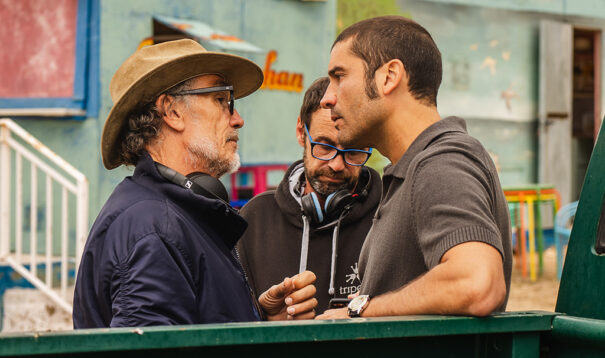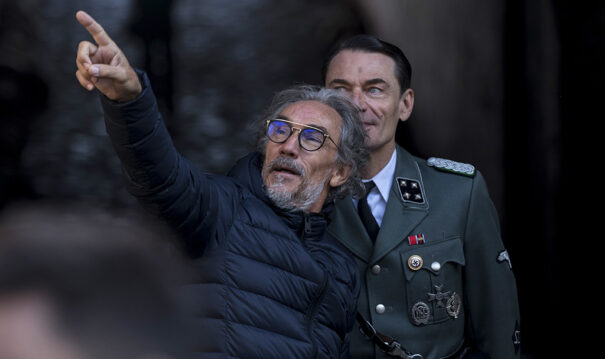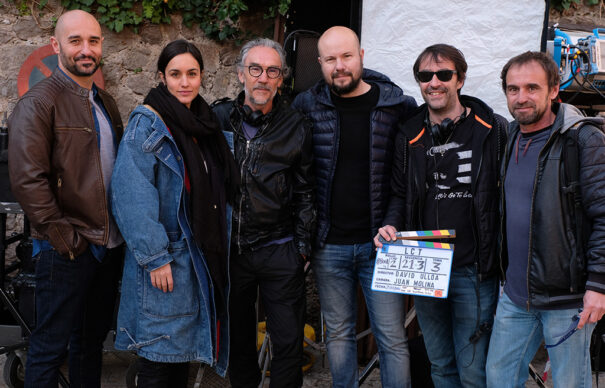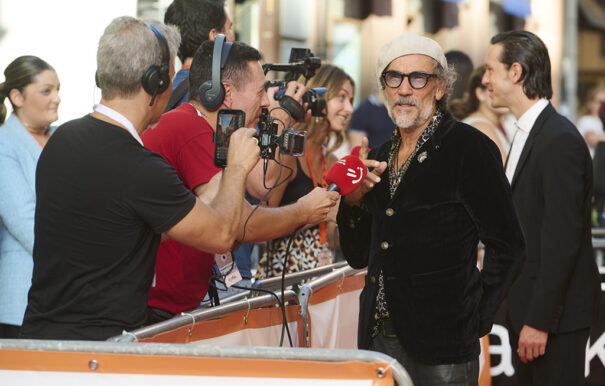José Manuel Lorenzo (DLO): "We take more risks when we move away from the originals"
La filosofía de DLO Producciones, su posición frente al modelo de originals o su visión sobre la producción cinematográfica son abordadas en profundidad por José Manuel Lorenzo, fundador, presidente y productor de la compañía autora de formatos como La caza, ‘Señor, dame paciencia’, ‘Dime quién soy’ o ‘El inmortal’.
El extenso currículum de José Manuel Lorenzo da cuenta de una amplia experiencia en todos los planos del universo televisivo. Su formación en TAI y en el terreno del marketing televisivo en la San Diego State University le abrió puertas como director comercial de CBS/Fox España and Televisión Española, como vicepresidente de Publiespaña o como director general comercial de Antena 3 en 1993, de la que acabaría siendo director general en 1995. Tras ejercer la dirección general de Canal+ durante seis años (1998-2004), acumuló experiencias en el ámbito de la producción como fundador del Grupo Drive (el musical Hoy no me puedo levantar o la película Un franco, 14 pesetas) y presidente de Boomerang (Física o química, Pekín Express), entre otras aventuras en el terreno cinematográfico.
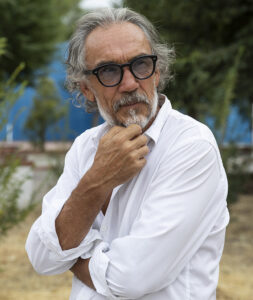 Tras estas iniciativas, llego el momento de andar en solitario con DLO Producciones, una productora de ficción, cine y televisión que se estrenó con una Solo quiero caminar de Agustín Díaz-Yanes (2011) que no tuvo el éxito esperado, pero que acabó por abrir la puerta a películas como Los Japón (2019) o Señor, dame paciencia (2022), series como Las aventuras del Capitán Alatriste (2015), La caza (2019) o The Immortal (2022), o formatos innovadores como Radio Gaga, un formato de slow TV que vio la luz en Movistar+.
Tras estas iniciativas, llego el momento de andar en solitario con DLO Producciones, una productora de ficción, cine y televisión que se estrenó con una Solo quiero caminar de Agustín Díaz-Yanes (2011) que no tuvo el éxito esperado, pero que acabó por abrir la puerta a películas como Los Japón (2019) o Señor, dame paciencia (2022), series como Las aventuras del Capitán Alatriste (2015), La caza (2019) o The Immortal (2022), o formatos innovadores como Radio Gaga, un formato de slow TV que vio la luz en Movistar+.
Durante los últimos años, DLO Producciones (participada por el Grupo Banijay desde 2013) ha profundizado su producción para plataformas como Netflix (El jardinero, Ni una más), Disney+ (Las largas sombras) o Movistar Plus+ (Segunda Muerte, El Inmortal, Dime Quién Soy), además de Prime Video, con la que ya se encuentran trabajando en un proyecto sin anunciar. Los modelos de producción en coordinación con las plataformas de vídeo bajo demanda ocupa gran parte de esta conversación con Lorenzo, sirviendo para abordar transversalmente otros temas de gran interés como el estado del audiovisual español, la producción independiente frente al nuevo modelo de plataformas, la ralentización en la creación cinematográfica, la voracidad en la producción de contenidos en España o un futuro en DLO que podrá estar marcado por un volumen mayor de producciones a corto plazo.
DLO Producciones, en su mejor-peor momento
¿DLO Producciones, con proyectos anunciados y en desarrollo para múltiples plataformas de vídeo bajo demanda, se encuentra en “velocidad de crucero?
Creo que nos encontramos, como diría siempre, en el mejor-peor momento de nuestra vida como DLO. Es el mejor momento porque este año se han hecho las cosas muy bien. Hemos podido conformar un equipo de gente en torno a DLO que habla el mismo idioma, tiene mucha ilusión y ha entregado productos de primer nivel. Esto nos ha dado una posición en el mercado extraordinaria. Así que sí: es el mejor momento para nosotros, pero también el peor porque tenemos mucho trabajo.
¿Cómo estructura su ritmo de producción DLO? ¿En cuántos formatos está trabajando actualmente, entre proyectos en producción y en desarrollo?
No nos consideramos una compañía grande, sino una empresa pequeña que cuida de cada una de nuestras producciones. Nunca hacemos dos a la vez. Tenemos la capacidad de preproducir una serie, producir otra y postproducir una tercera a la vez. En paralelo, tenemos un equipo de creativo muy interesante y proyectos en escritura, en preparación o en desarrollo. ¡Pero siempre de una en una!
No nos consideramos una compañía grande, sino una empresa pequeña que cuida de cada una de sus producciones. Nunca hacemos dos a la vez.
Cuidamos todos los planos de cada producción y le damos muchas vueltas. Somos muy poco industriales: nos centramos en abordar las cosas de manera artesanal, hacerlas muy bien y no volvernos locos ni crecer por encima de lo que supone controlar todos los procesos de un proyecto.
¿En alguna ocasión se han planteado la posibilidad de comenzar a producir varios proyectos en paralelo, doblando su ritmo de producción ante la alta demanda del mercado?
Se nos ha pasado muchas veces por la semana y, obviamente, es un debate interno. Yo, como fundador, dueño, presidente ejecutivo y productor de DLO, considero que abordar más cosas significaría perder esa impronta personal que trato de aplicarle a todos los proyectos; tendría que dedicarme a gestionar la productora y los proyectos que harían otros, y no he creado DLO para esto. DLO nace como un vehículo en el que, rodeado de un equipo maravilloso, puedo practicar el sueño que siempre he tenido de productor. He sido gestor de muchas cadenas de televisión y de grandes productoras, y ahora lo que intentamos es que nuestro nombre tenga cierto carácter y estén cuidados todos los procesos. Y para eso hay que estar encima, no queda otra. ¿Podemos crecer más? Sí. ¿Nos interesa? Todavía no.
El riesgo de los originals frente a las coproducciones
Comenta que DLO ha sido creado para poder producir proyectos con su sello personal. ¿Cómo se siente en el contexto actual de la industria, en el que los originals parecen comenzar a desplazarse a favor de modelos de coproducción quizá más tradicionales?
No creo que haya un modelo único al que aplicar. La versatilidad de este sector da muchas oportunidades. Entiendo y respeto las condiciones cuando estoy haciendo un original, ya sea para Netflix, Disney+, Amazon o Movistar Plus+, que son los streamers con los que he trabajado. Es una apuesta muy grande la que hacen estos agentes tomando el riesgo económico, por mucho que nosotros tomemos el riesgo en el desarrollo y la ejecución. Cuando uno juega a hacer originals, sabe a lo que juega.
Nadie te obliga a hacer originals. Si quieres hacerlo, será con sus reglas del juego, y si eres capaz de levantar una coproducción y tomar riesgos, también.
También es verdad que el mercado se va transformando poco a poco y empiezan a plantearse modelos de coproducción. De hecho, nuestras próximas series van por ese camino. Con este acercamiento, podemos quedarnos la IP con los beneficios fiscales que eso supone, tener parte de su distribución y gestionar la venta más allá del streamer. A ellos también les aligera su carga económica, y a nosotros nos abre otro tipo de riesgos de mercado.
Me gusta este sistema de lo híbrido en el que nos estamos instalando. Uno puede elegir o plantear bajo qué modelo hacer una serie o una película. Para mí, los dos son válidos, aunque es verdad que siempre nos gustaría que se respetara la capacidad creativa en cada proyecto. Pero bueno, no tengo una queja clara. Nadie te obliga a hacer originals. Si quieres hacerlo, será con sus reglas del juego, y si eres capaz de levantar una coproducción y tomar riesgos, también. Me parece interesante que podamos ampliar los modelos de negocio.
¿Este modelo de producción híbrida, con diferentes modalidades de negocio en el mundo de la ficción, beneficia a las productoras independientes?
DLO es una productora muy independiente. Contamos con el paragua de Banijay, que es socio estupendo porque nos entendemos muy bien y nos ayuda siempre financieramente, pero funcionamos por libre, en cualquier caso. Soy un productor independiente porque el control de la productora es mío, y eso me hace sentirme independiente. Entonces… ¿esta situación nos beneficia? Lo cierto es que tomamos muchos más riesgos cuando nos alejamos del modelo de originals. Tenemos que supervisar la distribución, hacer unas preventas, tratar de encontrar ventanas dentro y fuera de España, y buscar ayudas.
En realidad, corremos riesgo con todo: riesgos financieros, creativos… Desarrollamos muchos proyectos. Entre libros comprados y proyectos en desarrollo tenemos veinte formatos. Sé que a lo mejor hay diez que puede que nunca salgan o que empezarán a ver la luz dentro de cinco años, y hemos invertido mucho dinero en ellos. Es un riesgo que tomamos desde el primer día, pero es parte del juego y no hay empresario que no lo corra. Eso sí: si puedes combinar los dos modelos, vives mejor. Tomas riesgos en uno, y en el otro vas más asegurado. Ambos son válidos.
La creatividad y la industria española
¿La creatividad, a la que te has referido en varias ocasiones, tiene cabida en la producción actual, en la que en los últimos cinco años se está evolucionando de un modelo de microaudiencias a encargos cada vez más generales?
Lo que ha ocurrido supone una evolución estupenda. Todo viene de que hace muchísimos años, Antena 3, Telecinco, Televisión Española y algunas autonómicas españolas apostaron por la ficción y tuvieron un enorme papel en su desarrollo. Esto permitió crear desde España una forma de contar historias que ha acabado por funcionar en todo el mundo, mucho mejor de lo que habíamos pensado. Además, esto ha ayudado a formar durante años a guionistas, directores, técnicos, fotógrafos, músicos… Después de la americana, y por descontado la inglesa, creo que la producción española goza de una salud maravillosa a nivel mundial. No hay más que ver cómo funcionan las series españolas en el mercado latino o cómo hay varias series españolas colocadas en el top 100 de Netflix.
Es maravilloso poder hacer series de gran presupuesto sin tener que pensar que debes tener un niñoone abuela o un padre.
También me parece interesantísimo el papel que ha hecho Movistar Plus+ para contar nuestra historia cada vez con series más arriesgadas. La creatividad se ha abierto. Ya no trabajamos para audiencias generalistas, sino para públicos segmentados. Nos podemos permitir lujos que antes no podíamos a nivel de creatividad: desde los personajes, hasta las historias. Y, además, han mejorado muchísimos los presupuestos, lo que nos ha permitido trascender la industria local. Es maravilloso poder hacer series de gran presupuesto sin tener que pensar que debes tener un niño, una abuela o un padre.
Por otro lado, hemos recorrido el camino de adaptar libros, algo que hacía mucho tiempo que no se hacía. El tiempo entre costuras es un buen ejemplo, pero también hay muchas producciones totalmente originales que vienen desde un guion. Hemos abordado todos los campos, lo que hace que la creatividad esté como nunca. Es un momento muy dulce.
Tras trabajar con Movistar Plus+ en las dos temporadas de El Inmortal, están a punto de completar Segunda Muerte. ¿Cómo se está desarrollando la relación de DLO con este agente clave de la industria española?
He sido seis años director general de Canal+, he sido director general de Sogecable, director general de contenidos de toda la plataforma… Fueron unos años maravillosos y siempre he sentido Movistar Plus+ como mi casa. Creo que el liderazgo que ha supuesto la llegada de Cristina Burzako o Domingo Corral ha impulsado a la producción española a un sitio extraordinario. Para mí está siendo muy cómodo trabajar con ellos. La relación no ha sido inmediata. Desde que lanzaron La Peste de Alberto Rodríguez, tardamos cuatro o cinco años en lanzar nuestro primer proyecto con ellos, la serie de Dime quién soy basada en el libro de Julia Navarro. Gracias a ese trabajo en equipo, se desarrolló la relación personal y de confianza que Movistar Plus+ tiene en DLO y en José Manuel Lorenzo como productor.
Las plataformas nos ha cambiado la vida a todos.
Después ha llegado El Inmortal, que la primera temporada ha sido un éxito enorme, ahora vamos a estrenar la segunda y ojalá hagamos una tercera. Ya la tenemos preparada en cuanto al tipo de serie que queremos hacer. Ahora acabamos de terminar Segunda Muerte, un thriller escrito por Agustín Martínez con el que estamos muy contentos con ellos. También me parece muy interesante su modelo de cine de ir a salas.
Esta excelente relación de respeto sucede lo mismo con otros agentes como Disney+, Amazon o Netflix, con los que es una maravilla trabajar. Hoy en día, Netflix tiene muy claro lo que es, lo que quiere y lo que hace. Es una empresa muy abierta y creativa, con unos procesos internos absolutamente profesionalizados. Personas como Verónica Fernández o Diego Ávalos entienden a la perfección esta industria, te ayudan, te acompañan muy bien y, además, están cada vez más abiertos no solo a originals, sino a otros modelos de coproducción. Las plataformas nos ha cambiado la vida a todos.
La consumo sin límites y el cine
Plataformas como Netflix, Disney+, Prime Video o Amazon cuentan con ingentes catálogos que se alimentan de producción local y global. ¿Cree que se mantendrá la voracidad del consumidor, permitiendo a la producción española mantener el alto volumen de producción adquirido durante los últimos años?
Todas las plataformas quieren, lo primero, tener contento a sus abonados y no perderlos, y segundo, crecer en abonados en más territorios con un mayor índice de penetración. Solo se puede lograr eso estrenando todos los meses un abanico de proyectos que contenten a un abanico enorme de clientes. Si buscas ampliar tus suscripciones, es importante tener productos muy diferentes. Puedo entrar en una plataforma y tener diez cosas de las que elijo dos, pero mi vecino escogerá dos diferentes a las mías, porque somos familias diferentes y tenemos gustos diferentes. Por eso hay este ritmo tan voraz de estrenos: porque son muy importantes para que los clientes se mantengan y no se vayan, además de que los techos de crecimiento todavía están muy lejos.
Es muy importante atender al crecimiento del catálogo, no solo para captar a los nuevos clientes, sino para mantener a los que ya están dentro.
Otra cosa es que los techos de crecimiento se empiecen a romper. En ese caso, el objetivo será mantener a los suscriptores con muchos estrenos, porque las personas que no han visto las series que están en un catálogo es porque no las van a ver nunca. Este ritmo se va a mantener mientras compensen los presupuestos de inversión y haya perspectiva de crecimiento, y no veo que esto tenga un fin inmediato, ni siquiera prematuro o corto. Cuando la industria llegue a sus topes, se mantendrán los mismos presupuestos altísimos, pero a lo mejor no se harán 50, sino 40. Es muy importante atender al crecimiento del catálogo, no solo para captar a los nuevos clientes, sino para mantener a los que ya están dentro.
Durante los últimos años, DLO ha apostado por más series que películas. ¿Cuál es la visión de la productora sobre el cine? ¿La producción cinematográfica debe estar ligada a ventanas de estrenos preferentes más allá de las salas, sean streamers or broacasters?
El cine siempre ha sido mi pasión. Es verdad que, durante los últimos años, hemos producido más series que cine, pero en mi haber hay algunas películas que me siguen gustando como Solo quiero caminar de Agustín Díaz Yanes o Señor, dame paciencia, otra comedia que fue muy divertida. Eso sí, si todo sale bien, este año haremos dos películas grandes y tenemos dos más para el año que viene. La COVID ha hecho sufrir al cine y ha hecho que se perdiera la inercia de ir a las salas. Ahora estamos viendo que esta tendencia se vuelve a recuperar.
En el cine, abogo por un modelo híbrido en el que puedas hacer películas directamente para plataformas, otras con un estreno reducido y que caigan inmediatamente en los servicios de streaming, y otras para tener un largo recorrido en cine.
En este campo, abogo por un modelo híbrido en el que puedas hacer películas directamente para plataformas, otras con un estreno reducido y que caigan inmediatamente en los servicios de streaming, y otras para tener un largo recorrido en cine. Acabamos de ver un fenómeno tan grande como La sociedad de la nieve, que estoy seguro de que si hubiera estado más tiempo en salas hubiera recaudado muchísimo dinero. Optaron por un modelo híbrido haciendo 400.000 espectadores en tres semanas que estuvo en exhibición, y luego audiencias millonarias en todo el mundo a través de Netflix.
Debemos adaptarnos a los nuevos modelos en los que podemos desarrollar nuestros proyectos. Al final, los productores y creadores lo que queremos es crear nuestras historias, y que nos vean cuanta más gente y en cuanto más sitios del mundo, mejor. Que la gente elija si quiere verlo en las salas o en su casa. También las salas de cine se están convirtiendo en espacios que son como el salón de tu propia casa o incluso mejor, lo que es muy interesante.
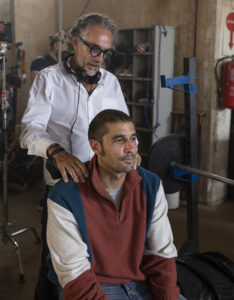 La inevitable evolución de DLO
La inevitable evolución de DLO
A lo largo de la conversación, ha defendido el modelo actual de artesanía de DLO con respecto al volumen de producciones. ¿Anticipa que este modelo podría variar siguiendo la tendencia del mercado durante los próximos años?
Nos ha costado mucho estar donde estamos; ser percibidos como una productora con un sello de alta calidad capaces de crear productos que funcionan. Estamos disfrutando de este momento, pero no debemos caer en el error de creérnoslo y hacer lo mismo doblando la producción. Tengo una edad, disfruto mucho de este trabajo como productor y como productor ejecutivo… pero tampoco quiero ponerles límites a las personas que se están formando conmigo y que probablemente, en unos años, tengan la enorme capacidad de llevar sus proyectos manteniéndome yo con el control de los míos bajo el mismo paraguas de DLO.
Nuestro crecimiento va a depender de la preparación de las personas de nuestra productora. Hay gente que se está desarrollando muchísimo que estoy seguro de que serán mejores productores que yo en el futuro, aunque solo sea porque yo voy cumpliendo años hacia una curva descendente y ellos lo van cumpliendo hacia una curva ascendente. Seguramente, en unos años nos iremos transformando paso a paso, y sé que algún día habrá personas como Miguel Lorenzo, un productor que trabaja conmigo, que dirá que quiere abordar un proyecto por sí mismo. En ese momento, ampliaremos nuestra capacidad de producción, pero eso llegará cuando lo podamos hacer de una manera muy orgánica y no industrial.
Estoy seguro de que va a tocar, porque la gente es demasiado buena y pueden hacer las cosas como a mí me gustan sin tener que estar yo encima. El día que ocurra eso, creceremos un poco… ¡Pero poco, no mucho!
Una entrevista de Sergio Julián Gómez
Did you like this article?
Subscribe to us RSS feed And you will not miss anything.
• Section: Cine, Cinema / Production, Interviews, Television, TV Production



